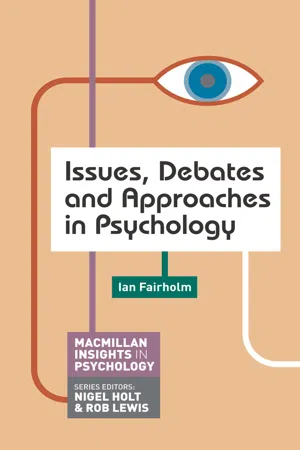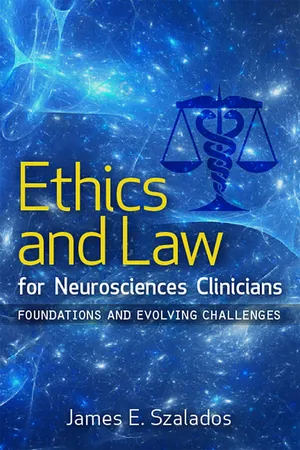Ethics of Neuroscience
The ethics of neuroscience refers to the moral principles and guidelines that govern the conduct of research and practice in the field of neuroscience. This includes considerations of informed consent, privacy, and the responsible use of emerging technologies such as brain imaging and neuroenhancement. Ethical considerations are crucial in ensuring the well-being of research participants and the responsible advancement of neuroscience knowledge and applications.
7 Key excerpts on "Ethics of Neuroscience"
- eBook - ePub
Bioethics
An Anthology
- Udo Schüklenk, Peter Singer, Udo Schüklenk, Peter Singer(Authors)
- 2021(Publication Date)
- Wiley-Blackwell(Publisher)
...Since the tools of philosophers are cognitive, and the sciences of the mind are concerned with the nature of cognition (broadly understood), the sciences of the mind are concerned with our tools: with their nature, their strengths and weaknesses and with their reliability. Hence the neuroethicist is adrift on Neurath’s boat to an even greater extent than most philosophers: she must address first‐order ethical issues using tools whose very reliability is one of her concerns Given the dual focus of neuroethics, on first‐order ethical questions arising from the sciences of the mind, and on the tools the neuroethicist uses in addressing these questions, neuroethics might be said to have two distinct branches. Roskies calls these two branches the Ethics of Neuroscience and the neuroscience of ethics. The Ethics of Neuroscience is concerned with first‐order ethical issues; the neuroscience of ethics with normative ethics, meta‐ethics and moral psychology insofar as these branches of philosophy are illuminated by the sciences of the mind. The Ethics of Neuroscience The sciences of the mind offer us a range of apparently unprecedented powers to intervene in the mind of human beings, some actual, some just over the horizon, and some very distant (it is a matter of lively dispute which technologies are distant and which imminent). These powers arouse a great deal of unease in many people, prompting philosophers to reflect upon the permissibility of their use. These actual or potential powers include the ability to enhance cognition, to modify memories and emotions, and to control or insert beliefs. 1 Each of these has been the focus of sustained ethical reflection. For reasons of space, I shall consider only the first two topics (see Levy, Neuroethics for discussions of the ability to control or insert beliefs). Memory Modification and Enhancement Existing techniques to modify memories are relatively crude and weak...
- Larry Alexander, Kimberly Kessler Ferzan, Larry Alexander, Kimberly Kessler Ferzan(Authors)
- 2019(Publication Date)
- Palgrave Macmillan(Publisher)
...Part XIX Neuroscience © The Author(s) 2019 L. Alexander, K. K. Ferzan (eds.) The Palgrave Handbook of Applied Ethics and the Criminal Law https://doi.org/10.1007/978-3-030-22811-8_20 Begin Abstract 20. Neuroscience and Criminal Law: Perils and Promises Stephen J. Morse 1 (1) University of Pennsylvania, Philadelphia, PA, USA Stephen J. Morse Email: [email protected] End Abstract This chapter addresses the potential contributions of neuroscience to criminal justice decision-making and policy, with special emphasis on criminal responsibility. The neurosciences in question are the behavioral neurosciences, such as cognitive, affective, and social neuroscience, because these are the types of neuroscience most relevant to law. There have been major advances in these fields since the beginning of the present century when non-invasive functional magnetic resonance imaging (fMRI) to investigate brain function became widely available for research. The central question for this chapter is whether the neuroscience is relevant to criminal justice. The general conclusion is that it is scarcely useful at present but may become more relevant as the science progresses. Many readers of this chapter may not be lawyers, so the chapter begins with a brief explanation of the meaning of criminal responsibility that is used throughout. It then speculates about the source of claims for the positive influence of neuroscience. The next section discusses the scientific status of behavioral neuroscience. Then it addresses two radical challenges to current conceptions of criminal responsibility that neuroscience allegedly poses: determinism and the death of agency. The question of the specific relevance of neuroscience to criminal law doctrine, practice, and institutions is considered next. This is followed by a discussion of how neuroscience evidence is being used in criminal cases in five different countries, including the United States...
- eBook - ePub
- Ian Fairholm(Author)
- 2012(Publication Date)
- Bloomsbury Academic(Publisher)
...The use of the Internet, for example, as both a research object and a medium for data collection, has developed significantly since the 1990s, and in a relatively short space of time the range of methodologies used and topics addressed by Internet-based research has increased greatly (Bell & Kennedy, 1999). Internet-based research is just one example of how psychological research can change dramatically over time and can throw up new ethical issues and challenges that might not even have been contemplated in earlier times. Definition of ethics Of course ethical issues are not unique to psychology. The term ‘ethics’ refers to a very broad range of topics and areas but can basically be considered to refer to a series of rules and guidelines that are useful and important when carrying out interactions with people and animals. As with most issues and debates within psychology, the origins of the consideration of ethical issues can be found within philosophy. Philosophers have considered, over the course of many centuries, concepts such as good and evil, right and wrong, equality and justice, and they have also sought answers to questions such as ‘What does it mean to live a good life?’ Many of these concepts and questions are not really directly appropriate to the field of psychology, but ethical issues are not just a series of philosophical quandaries – applied ethics is a discipline within philosophy that is specifically interested in how theoretical ethical issues apply to real-life situations. Psychology is involved with a number of real-life situations that raise ethical issues, and these mainly relate to the duty of care that psychologists have, whether to patients or clients in the case of clinical psychologists or psychotherapists, or to participants or subjects in the case of psychological research...
- eBook - ePub
Ethics and Law for Neurosciences Clinicians
Foundations and Evolving Challenges
- James E Szalados(Author)
- 2019(Publication Date)
- Rutgers University Press(Publisher)
...If neuroscience could correlate neurophysiology with a state of mind, expert testimony could be validated, replicated, and fair. Neuroscience considerations are increasingly being applied to the legal areas of intellectual property law, tort law, consumer law, health law, employment law, and criminal law. 7 Moreover, Constitutional law becomes implicated not only at a legal level but at an ethical level, since a question of whether or not an individual’s neural makeup or functioning could constitute legally discoverable evidence, and whether or not such an intrusion into one’s personal thoughts or motivations, potentially arising from neurochemical and neuroanatomical processes, would challenge individual rights and freedoms. 8 The legal system necessarily assumes that humans are “practical reasoners” and that a conscious deliberation underlies actions, free will, and free decisions in the absence of duress or deceit. Nonetheless, there are many examples of neurological disorders in which either there is a will to act and action is not possible, or there is action without will. Tourette’s syndrome is one example of a condition where actions occur in the absence of free will, and there is no conscious override ability to repress actions. Conventionally, behavior has been in the realm of psychiatry or psychology, whereas neurologic disorders have been addressed by neurology or neurosurgery. Biology and decision-making are now increasingly seen as intertwined...
- eBook - ePub
- Sarah Coakley, Sarah Coakley(Authors)
- 2012(Publication Date)
- Wiley-Blackwell(Publisher)
...15 THE NEUROSCIENCE OF EMOTION AND REASONING IN SOCIAL CONTEXTS: IMPLICATIONS FOR MORAL THEOLOGY MICHAEL L. SPEZIO The neuroscience of emotion and moral action should be of widespread interest to the fields of moral philosophy and theology, and to anyone interested more generally in normative claims regarding practical thought. That this is true is not always clear to philosophers and theologians, and that such a claim can be made from a framework that explicitly rejects psychologism may be even less so. Yet the first of two central theses of the present chapter is that moral philosophy and theology have much to gain from engagement with neuroscience; the other is that the neuroscience of emotion and moral action provides strong evidence for the adaptive, integrative function of emotion in reasoned choice. Moral theories that are virtue-based, or based in divine commands, or inspired by Humean concerns, or even those that reject any moral justification outside of the autonomous law of reason, have reason to attend to current neuroscientific investigations of emotion, and their sometimes surprising implications. Moral systems arguing that the virtues ground moral justification would be interested in how emotion and perception combine in deliberating and actualizing dispositions in given morally relevant contexts. 1 Those systems in which moral exemplars play a critical role in moral justification, as argued by Linda Zagzebski, 2 will want to know how current neuroscientific accounts of emotion help account for how we understand and reason about the thoughts, emotions, and intentions of other people...
- eBook - ePub
Laboratory Psychology
A Beginner's Guide
- Julia Nunn, Julia Nunn(Authors)
- 2018(Publication Date)
- Psychology Press(Publisher)
...Washington, DC. Copyright © 1973 and 1982, APA. Reprinted with permission. (The APA cautions that the 1990 Ethical principles of psychologists are no longer current and that the guidelines and information provided in the 1973 and 1982 Ethical principles in the conduct of research with human participants are not enforceable as such by the APA Ethics code of 1992, but may be of educative value to psychologists, courts, and professional bodies.) A separate set of guidelines for animal research exists; however, as this book is primarily concerned with practices relevant to cognitive psychology, they have been omitted. As Kimmel (1996) has noted, few of the statements contained within the guidelines consist of absolute prohibitions. In most cases, the APA has clearly adopted a policy that emphasises the weighing of considerations that maximise benefits relative to costs (cost-benefit assessment). As a consequence, considerable thought and consideration on the part of the investigator is still required before ethical solutions may be reached. Although it is probably fair to say that the guidelines for psychological research provide a reasonable framework within which researchers can analyse ethical issues, ethical dilemmas are not solved simply by reading such guidelines! The next section provides a commentary on some methodological issues provoked by the core components of ethical guidelines. Translating ethical principles into valid research methods Informed consent and deception Informed consent means that the participants must be forewarned about those aspects of the research that may have detrimental effects. It is considered by many as the central norm governing the relationship between the investigator and the research participant. Although participants are not usually misled as to the nature of the experiences they will have during the experiment, they are however frequently misled as to the true purpose of the experiment...
- eBook - ePub
- Andrew B. Newberg(Author)
- 2016(Publication Date)
- Routledge(Publisher)
...In other words, neurotheology should not be considered the “neuroscientific study of religious or theological concepts,” a procrustean trap that many scholars have fallen into. Theology and religion must also be able to inform us freely about neuroscience and how we interpret the human person from a psychological, social, and spiritual perspective. By enabling a free exchange of ideas, data, and information, neurotheology can achieve a very high level of sophistication. This yields the final neurotheological principle of interaction between science and religion: Principle VII: Neuroscientific and theological perspectives must be considered to be comparable contributors to neurotheological investigations. By comparable, I mean that both perspectives should have similar, and reciprocal, emphasis in the overall dialogue between neuroscience and theology. However, it must also be clear that there are investigations and arguments that will sometimes be weighted more towards neuroscience or towards theology. For example, an analysis of a specific sacred text might lead to a primarily theological interpretation with minor assistance from the neuroscientific perspective regarding a particular logical argument. On the other hand, a study designed to explore the brain changes during a particular religious practice will more likely require emphasis on neuroscientific methodology. Again, though, any interpretations from such investigations should strive to include both perspectives. It should be re-emphasized that those scholars and researchers in other fields may not necessarily find this principle applies to their respective areas of work. After all, a biology researcher should not be expected to include any discussion of religion in the context of cloning a mouse genome. Similarly, philosophical and theological arguments might ultimately not require any input from science...






